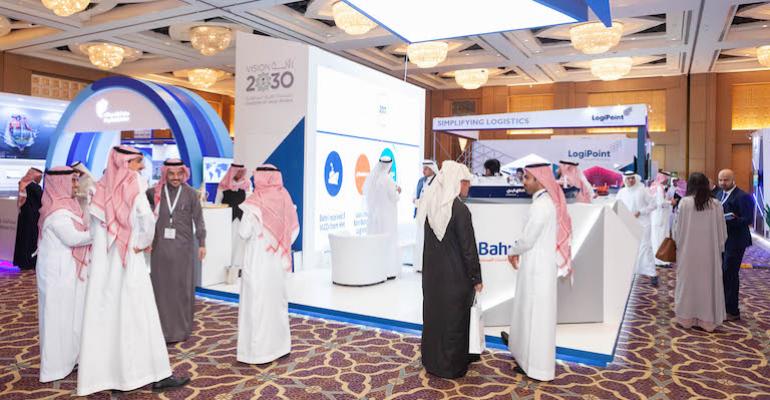Ships built before 2020 are likely to remain in the fleet until around 2045, and new low-or zero-carbon fuels are unlikely to be available at scale for some time yet, therefeore the efficiency of these existing vessels will need to be upgraded. This was one of the conclusions agreed by panellists at at Marintec Innovation webinar yesterday titled ‘Defining the Path to Decarbonisation’.
They included shipping economist, Dr Martin Stopford, who gave the keynote address. The session was moderated by Dr Wang Jinbao, Deputy Director of International Exchange Committee of Shanghai Society of Naval Architects and Marine Engineers. Other presenters included Carnival’s Senior Vice President, Maritime Affairs, Tom Strang; Professor Wang Zhaolin of Xiamen University; Christian Berg, Director, Bunkering Market Development at Yara Clean Ammonia; and Chris Chung, Director, Regional Sales and Ecosystem Development at Wärtsilä Voyage.
Stopford set out some of the challenges. He said that world population and GDP growth between now and the middle of the century – increases of about a quarter and nearly double respectively – means that there is no time to waste in making carbon efficiency gains. And the technologies are available to do so, he said, with some new ships incorporating a range of carbon-reducing features.
However, he said that existing vessels are likely to generate about half of shipping’s total emissions between 2020 and 2050. Retrofitting of carbon-reducing technologies will therefore be essential and IMO’s EEXI and CII regulations, due to enter force in January, will accelerate this process.
Yara’s Berg said that he expected a spot market to develop in some alternative fuels but that many ship operators would strive to cover additional costs by entering into medium- and long-term arrangements with their customers. Meanwhile, he said that a carbon price of $250 per tonne would make new fuels such as blue ammonia competitive.
Yara is focusing attention on ammonia as a potential fuel in both the offshore and coastal bulk carrier sectors, Berg said. The company expects to have clean ammonia available as fuel from a new bunker barge approved by DNV in 2024, and to have 2.5m tonnes per annum available as marine fuel by the end of the decade. Short-sea vessels would start to use the fuel from 2024/25, but would not switch to 100% ammonia from day one.
Professor Wang, also an expert on ammonia, stressed the need for a step-by-step approach to new fuels. Blending, he said, offered a safer option so that the impact of new fuels could be carefully assessed. If ammonia is adopted as a fuel, there could be no unburnt fuel present in the exhaust gas so complete combustion would be essential.
He suggested that a 20% ammonia blend could steadily be increased, perhaps to align with tightening CII requirements over the second half of the decade. He suggested that performance of fuels ultimately intended for deep-sea ships should initially be tested on short-sea vessels, which are easier to monitor and make interventions if necessary. Tests at sea could be matched by trials in other transport modes, he suggested, such as heavy construction plant ashore, to mitigate risk.
Carnival’s Strang described the decarbonisation journey faced by cruise operators as “massively exciting and massively challenging”. On imminent IMO regulations, he said that CII does not work for cruise operators for various reasons, including very high hotel loads and a disproportionat amount of time spent in port. To sail more slowly would either extend the length of cruise holidays or reduce the time for port calls and shore excursions. The implication was that neither would be popular with customers.
However, he said that Carnival’s goal is to make significant carbon emission reductions across its fleet and a wide range of tests and trials are currently in progress. The world’s largest cruise line, which joined the Mærsk Mc-Kinney Møller Center for Zero Carbon Shipping earlier this year, is testing a 10MW battery installation on one vessel, and now has more than 40% of its ships equipped to use shore power in port (with a target of 60%). A range of other trials are under way, he said.
Wärtsilä Voyage’s Chung emphasised the importance of the ‘connected ship’ and particularly the smart ship/smart port connection. Digital technology was a key enabler for an entirely new level of monitoring so that personnel both at sea and ashore could be supported in optimising voyage planning on a dynamic basis, and adopting new digital technologies such as just-in-time arrivals for maximum fuel economy.
He mentioned the company’s involvement with various ports and revealed details of one project in the Port of Rotterdam. A fully autonomous vessel is under development to transfer containers from one part of the port to another. The result will be improved efficiency and a significant reduction in shoreside vehicle emissions.
Stopford emphasised that the process will take time and stressed the importance of information management and exchange, as well as accurate data. Shipping companies have had access to huge amounts of data in the past, he said, but no means of processing it. Now, those systems are available.
A priority will be managing the human element, the panellists agreed, making sure that people both at sea and ashore have the necessary digital skills to make the most of potential efficiency gains. “This new era will need much more people management,” Stopford declared.







